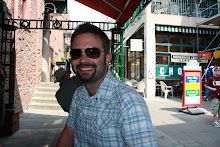
So in my last post I was lamenting a bit about trying to write, and write successfully, and create something out of the mash of personal experiences, current affairs, historical themes and random ideas bubbling around in your head. I guess I look up to people like Dave Eggars, who seem to be able to so effortlessly craft a tale with his imagination. I know from working on stories myself and hearing authors first hand speak about how hard they work on just a draft of a story, that my impression of the process being "effortless" is a bit flawed. However, I can not ever stop seeing my own shortfalls in comparison to more prolific (and published) writers.
Dave Eggars' novel "What is the What" is a particualrly good example of this. After hearing the story of Valentino Achek Deng, he created a marginally fictionalized version of the tale, putting his own masterfull touch on it, making the words weep on the page. It is the paticular ability to do this that I envy; that characters, places and events stand out and move so clearly, that the world that is created becomes so brilliantly real for a short time.
What is the What is an unrelentingly harsh story of the survival of one of Sudans Lost Boys. Eggars tells of how all of the Lost Boys, after being driven from their homes by war, walk through the deserts of Sudan and Ethiopia, constantly chased and attacked by the army, and finally ending up in a refugee camp in Kenya. This is when current events begin to tie into the story. While living in Kenya, the refugees hear of terrorist attacks on American embassies in Kenya and the first bombing of the World Trade Center. The lost boys, who have never known a world outside of Sudan, do not know what all of this means, but they are assured that with America's bombing of Sudans capital, their return home will be imminent.
The story is told by Valentino in present day Atlanta, struggling to find his place in America, while re-telling the story of his childhood and his eventual move to the US. Eggars words, while recrafting Valentino's words, are beautiful in their simplicity. There is no need to embellish or use word games to trap the reader. The story itself, Valentino's story, is so compelling and real that it could never be all fiction. I can only hope to one day create something so beautiful.







No comments:
Post a Comment